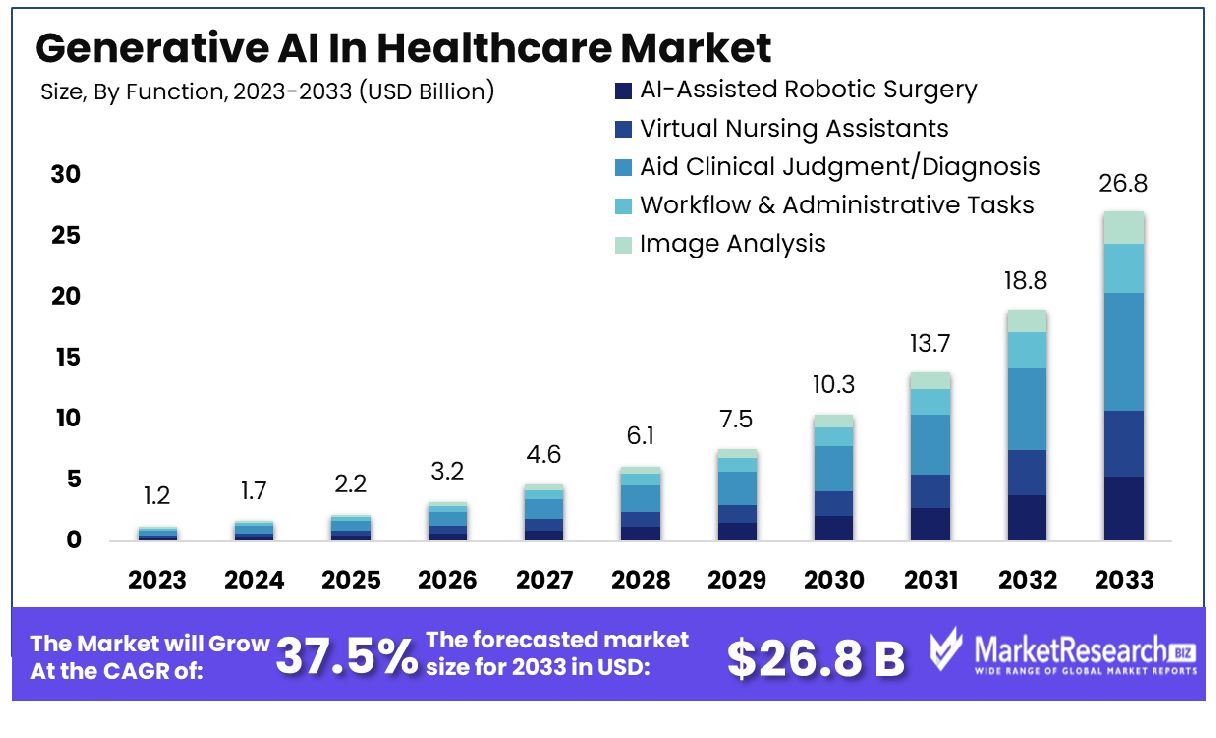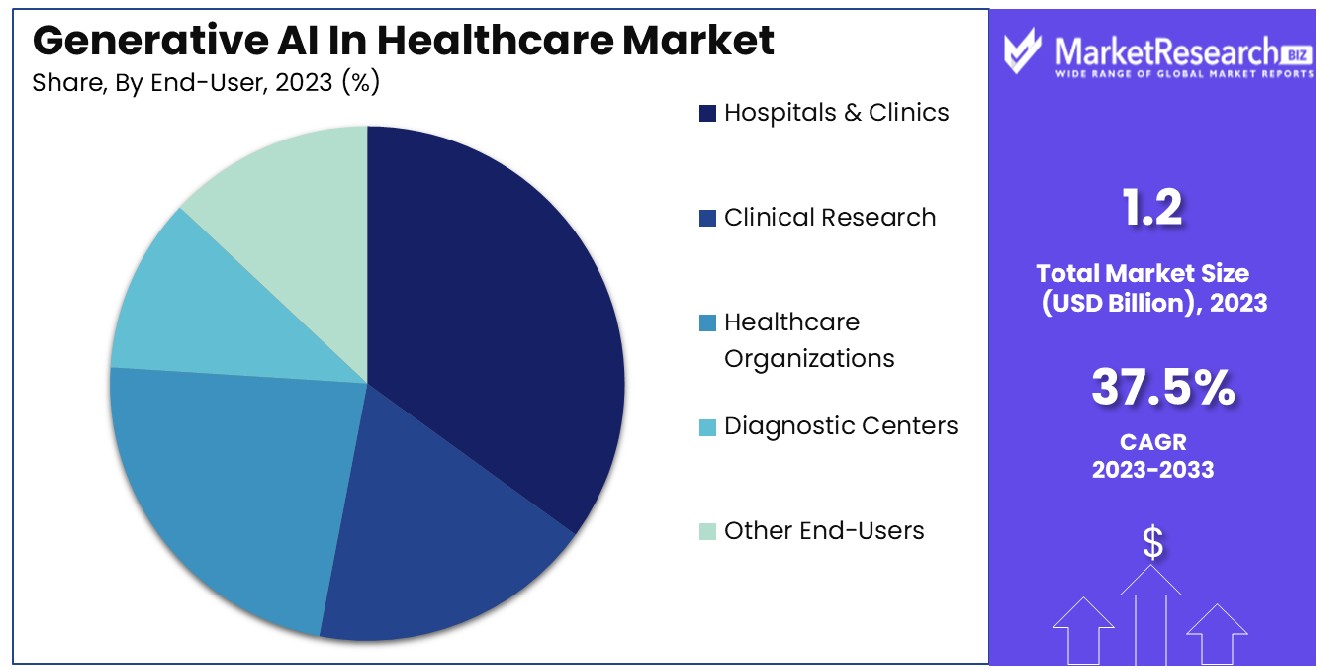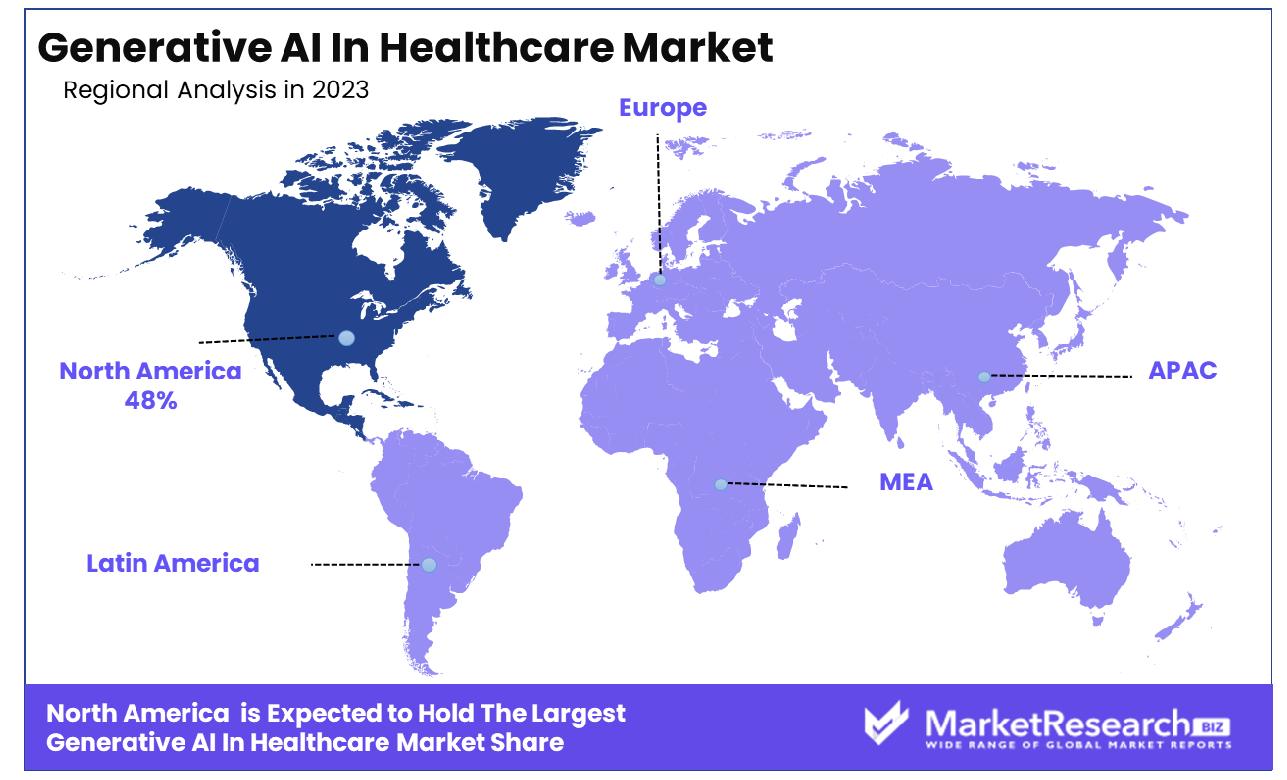
Generative AI In Healthcare Market By Application(Clinical Application(Cardiovascular, Dermatology, Infectious Diseases, Oncology, Others), System Application(Disease Diagnosis, Telemedicine, Electronic Health Records, Drug Interaction)), By Function(AI-Assisted Robotic Surgery, Virtual Nursing Assistants, Aid Clinical Judgment/Diagnosis, Workflow & Administrative Tasks, Image Analysis), By End-User(Hospitals & Clinics, Clinical Research, Healthcare Organizations, Diagnostic Centers, Other End-Users), By Region And Companies - Industry Segment Outlo
-
38925
-
August 2024
-
300
-
-
This report was compiled by Vishwa Gaul Vishwa is an experienced market research and consulting professional with over 8 years of expertise in the ICT industry, contributing to over 700 reports across telecommunications, software, hardware, and digital solutions. Correspondence Team Lead- ICT Linkedin | Detailed Market research Methodology Our methodology involves a mix of primary research, including interviews with leading mental health experts, and secondary research from reputable medical journals and databases. View Detailed Methodology Page
-
Quick Navigation
Report Overview
The Global Generative AI In Healthcare Market was valued at USD 1.2 billion in 2023. It is expected to reach USD 26.8 billion by 2033, with a CAGR of 37.5% during the forecast period from 2024 to 2033.
The Generative AI in Healthcare Market refers to the sector focused on integrating generative artificial intelligence technologies within healthcare settings to innovate and enhance patient care, diagnosis, treatment, and administrative processes. This market explores the applications of AI models that can generate synthetic data, simulate patient responses, automate content for patient management, and provide decision-making support in clinical environments.
As this technology progresses, it promises significant advancements in personalized medicine, operational efficiency, and patient outcomes, thereby presenting substantial opportunities for investment and growth within the healthcare industry. Key stakeholders include healthcare providers, technology firms, and strategic investors.

The Generative AI in Healthcare Market is poised for substantial growth, driven by its potential to revolutionize healthcare processes and outcomes. The technology's capacity to automate administrative tasks is already recognized by 72% of healthcare leaders, enabling clinicians to dedicate more time to direct patient care. Despite its promise, as of 2021, only 20% of healthcare organizations globally had implemented AI models in production, highlighting a significant gap between interest and execution.
Nevertheless, 98% of healthcare organizations report having a strategy or plans to develop one for AI implementation, underscoring a strong directional shift toward embracing AI technologies. Furthermore, 75% of health system executives hold the belief that generative AI will fundamentally transform the industry. However, a mere 6% of these executives have formulated a specific plan to integrate generative AI technologies, suggesting that while the outlook is optimistic, the pathway to widespread adoption is still in its nascent stages.
This disparity between recognition of potential benefits and actual implementation plans presents a unique opportunity for strategic investments and initiatives to accelerate deployment and realize the transformative capabilities of generative AI in healthcare.
Key Takeaways
- Market Growth: The Global Generative AI In Healthcare Market was valued at USD 1.2 billion in 2023. It is expected to reach USD 26.8 billion by 2033, with a CAGR of 37.5% during the forecast period from 2024 to 2033.
- Regional Dominance: North America holds 48% of the generative AI healthcare market.
- By application: Disease Diagnosis held a 45% dominance rate.
- By function: Clinical Judgment/Diagnosis led with 50% dominance.
- By end-users: Hospitals & Clinics dominated with a 55% share.
Driving factors
Increasing Demand for Personalized Medicine and Tailored Treatment Plans
The demand for personalized medicine and tailored treatment plans is significantly driving the growth of the Generative AI in Healthcare Market. Personalized medicine aims to tailor medical treatments to individual characteristics, conditions, and preferences, requiring sophisticated data analysis and predictive capabilities.
Generative AI excels in these areas by synthesizing and analyzing vast amounts of patient data, thereby enabling the creation of highly specific treatment plans. This approach not only enhances patient outcomes but also optimizes treatment methodologies, making the use of Generative AI crucial for healthcare providers aiming to deliver cutting-edge, patient-centered care.
Rising Healthcare Data Availability and Advancements in Machine Learning
The exponential increase in healthcare data availability coupled with rapid advancements in machine learning algorithms has created a fertile ground for Generative AI applications in healthcare. The integration of large-scale healthcare datasets with advanced AI models facilitates the generation of new insights into patient care processes, disease patterns, and treatment outcomes.
Machine learning models, particularly those based on Generative AI, are increasingly capable of handling complex, multifaceted data sets, leading to more accurate diagnostics, predictive analytics, and personalized treatment options. This synergy is propelling the adoption of AI technologies in healthcare institutions globally.
Growing Need for Cost Reduction and Efficiency in Healthcare Operations
Healthcare providers are constantly seeking ways to reduce costs and enhance operational efficiencies, a challenge that Generative AI is uniquely positioned to address. By automating routine tasks, optimizing treatment protocols, and predicting patient admission rates, Generative AI helps significantly reduce overheads and improve service delivery.
Moreover, the predictive capabilities of AI can lead to better resource management, from staffing to medical inventory, thereby minimizing waste and reducing operational costs. This efficiency not only supports financial health in the healthcare sector but also improves patient care by redirecting resources to critical areas.
Restraining Factors
Ethical and Legal Concerns Regarding AI-Generated Healthcare Data
The ethical and legal concerns surrounding AI-generated healthcare data significantly influence the market dynamics for Generative AI in healthcare. These concerns stem from issues related to data privacy, consent, and the potential for bias in AI algorithms, which can lead to disparities in patient care. Regulatory challenges also play a crucial role, as there is a need for frameworks that ensure AI solutions are compliant with healthcare standards and ethical norms.
These factors can hinder the adoption of Generative AI technologies as healthcare providers and patients may exhibit skepticism or resistance due to fears of data misuse or inaccuracies in AI-generated insights. The establishment of robust ethical guidelines and transparent regulatory practices is essential to mitigate these concerns and foster trust in AI applications within the healthcare sector.
Complexity in Integrating AI with Existing Healthcare Systems
Integrating Generative AI technologies with existing healthcare systems presents significant challenges, primarily due to the complexity and variability of these systems. Healthcare providers often operate with legacy systems that are not designed to interact seamlessly with advanced AI technologies. This integration requires substantial investments in upgrading IT infrastructure and training staff, which can be costly and time-consuming. Moreover, the need for continuous maintenance and updates adds to the operational complexities.
These barriers can slow down the implementation of AI solutions and limit their potential impact on enhancing healthcare efficiency and patient care. However, overcoming these challenges is crucial for leveraging the full capabilities of Generative AI to revolutionize healthcare practices.
By Application Analysis
System Application in Disease Diagnosis led the market, accounting for 45% of the total.
In 2023, System Application - Disease Diagnosis held a dominant market position in the By Application segment of the Generative AI in Healthcare Market, capturing more than a 45% share. This sector's leadership illustrates the integral role AI has assumed in diagnosing diseases, fueled by advancements in machine learning and data analytics. Other critical areas under System Application include Telemedicine, Electronic Health Records, and Drug Interaction.
The Clinical Application sub-segments, such as Cardiovascular, Dermatology, Infectious Diseases, Oncology, and Others, also significantly integrate generative AI. These applications focus on specific disease diagnostics and personalized treatment plans, enhancing the precision and effectiveness of medical interventions. Oncology and Cardiovascular are particularly noteworthy for their reliance on AI to interpret complex data sets and improve patient outcomes.
Telemedicine has utilized AI to bridge the gap between remote patients and medical services, offering real-time monitoring and consultation capabilities that are crucial for accessible healthcare services. The use of AI in Electronic Health Records has streamlined data management, ensuring more accurate and timely patient information, which enhances overall healthcare delivery.
Moreover, the application of AI in Drug Interaction has emerged as a vital tool in predicting adverse drug reactions and optimizing pharmacotherapy, which is critical for patient safety and effective treatment planning.
As generative AI continues to evolve, its application in Disease Diagnosis remains at the forefront, driven by the need for accuracy, efficiency, and reduced healthcare costs. The broadening of AI applications across different healthcare sectors points to a robust growth trajectory, promising significant improvements in healthcare outcomes and operational efficiencies.
By Function Analysis
Systems aiding Clinical Judgment/Diagnosis dominated, holding a 50% share of the market.
In 2023, Aid Clinical Judgment/Diagnosis held a dominant market position in the By Function segment of the Generative AI in Healthcare Market, capturing more than a 50% share. This prominence underscores the pivotal role of AI in enhancing diagnostic accuracy and decision-making in medical settings. Other key functions facilitated by generative AI include AI-Assisted Robotic Surgery, Virtual Nursing Assistants, Workflow & Administrative Tasks, and Image Analysis.
AI-Assisted Robotic Surgery and Image Analysis are notable for their application of AI in performing precise surgical procedures and in analyzing medical imagery with high accuracy, respectively. Both areas have shown significant growth, driven by technological advancements and increasing trust in AI capabilities among healthcare professionals.
Virtual Nursing Assistants are emerging as crucial components in patient management, providing 24/7 assistance and monitoring, which is vital for chronic disease management and elderly care. This function is expected to see accelerated growth as the technology advances and integrates more seamlessly into patient interactions.
The function of AI in Workflow & Administrative Tasks is also expanding, with AI applications increasingly employed to optimize hospital operations, reduce administrative burdens, and improve the overall efficiency of healthcare delivery. This segment benefits from AI's ability to handle large volumes of data and automate routine tasks.
Overall, the Aid Clinical Judgment/Diagnosis segment continues to lead due to the critical nature of accurate diagnostics in healthcare outcomes. As AI technologies become more sophisticated, their integration across diverse healthcare functions is anticipated to enhance both the quality and efficiency of care, presenting numerous opportunities for market expansion and innovation.
By End-User Analysis
Hospitals & Clinics were the primary segment, dominating with a 55% market share.
In 2023, Hospitals & Clinics held a dominant market position in the By End-User segment of the Generative AI in Healthcare Market, capturing more than a 55% share. This segment outperformed other categories, which include Clinical Research, Healthcare Organizations, Diagnostic Centers, and Other End-Users. The substantial share held by Hospitals & Clinics can be attributed to the accelerating adoption of AI technologies for enhancing diagnostic accuracy, patient care, and operational efficiency in these settings.
Clinical Research entities, leveraging generative AI for drug discovery and clinical trials, accounted for the second-largest share. These applications are critical as they reduce the time and cost associated with bringing new therapies to market. Healthcare Organizations followed, integrating AI to streamline processes and improve patient outcomes through predictive analytics and personalized treatment plans.
Diagnostic Centers also utilized generative AI, primarily for imaging and pathology, to provide faster and more accurate diagnoses. The category of Other End-Users, which includes small practices and outpatient services, is gradually integrating AI tools but at a slower adoption rate compared to larger institutions.
The prominent growth of generative AI in Hospitals & Clinics is driven by the need for robust health infrastructure capable of managing large patient volumes and complex cases. Investment in AI by these institutions is expected to grow, driven by demonstrable improvements in patient outcomes and system efficiencies. As AI technologies evolve, their integration across various healthcare settings is likely to expand, offering significant growth opportunities for developers and providers of AI solutions in the healthcare sector.

Key Market Segments
By Application
Clinical Application
- Cardiovascular
- Dermatology
- Infectious Diseases
- Oncology
- OthersSystem Application
- Disease Diagnosis
- Telemedicine
- Electronic Health Records
- Drug InteractionBy Function
- AI-Assisted Robotic Surgery
- Virtual Nursing Assistants
- Aid Clinical Judgment/Diagnosis
- Workflow & Administrative Tasks
- Image Analysis
By End-User
- Hospitals & Clinics
- Clinical Research
- Healthcare Organizations
- Diagnostic Centers
- Other End-Users
Growth Opportunity
Development of AI Applications for Drug Discovery and Clinical Trials
The year 2023 presents substantial opportunities for the generative AI in healthcare market, particularly through the development of AI applications in drug discovery and clinical trials. Generative AI can significantly accelerate the drug development process by predicting molecular interactions at a pace much faster than traditional methods. AI models are able to generate and screen potential drug candidates, optimize their chemical properties, and predict their effectiveness and safety profiles, which can drastically reduce the time and cost associated with drug development.
Furthermore, AI's application in clinical trials can enhance patient selection processes, monitor treatment responses more effectively, and predict trial outcomes, thereby improving the efficiency and success rates of clinical trials. These advancements not only promise to speed up the introduction of new drugs to the market but also enhance the precision of clinical research, driving substantial growth in the healthcare sector.
Expansion of AI-Powered Diagnostic Tools and Medical Imaging
Another significant opportunity in 2023 lies in the expansion of AI-powered diagnostic tools and medical imaging. AI algorithms have the capability to analyze complex medical images with high accuracy and at a fraction of the time taken by human counterparts. This capability is particularly transformative in diagnosing diseases at earlier stages and with greater precision. For instance, AI-powered systems in radiology can detect anomalies that are sometimes overlooked in manual examinations, leading to earlier interventions and better patient outcomes.
The continued advancement and integration of AI in medical imaging not only supports healthcare providers in delivering more accurate diagnoses but also paves the way for more personalized treatment plans. As these technologies gain further trust and validation, their adoption is expected to surge, thereby driving the growth of the generative AI market in healthcare.
Latest Trends
Adoption of AI for Predictive Analytics in Patient Monitoring and Prognosis
In 2023, one of the most impactful trends within the global Generative AI in Healthcare Market is the adoption of AI for predictive analytics in patient monitoring and prognosis. This application of AI facilitates a transformative shift from reactive to proactive healthcare models. AI algorithms are increasingly being deployed to analyze real-time data from patient monitors, wearable devices, and electronic health records to predict patient outcomes, detect potential complications early, and personalize patient care plans.
Such predictive capabilities are particularly valuable in critical care and chronic disease management, where early intervention can significantly alter patient outcomes. This trend is not only improving the quality of care but also reducing the burden on healthcare systems by preventing hospital readmissions and enabling more efficient resource allocation. The continued advancement in machine learning models and their integration into clinical workflows is expected to drive further adoption and refinement of these technologies, significantly enhancing patient care and operational efficiencies in healthcare facilities.
Integration of Blockchain for Secure Data Sharing in AI Applications
Another leading trend is the integration of blockchain technology to enhance the security and efficiency of data sharing in AI applications. Blockchain provides a decentralized and tamper-proof platform, ensuring the integrity and confidentiality of sensitive medical data when used in conjunction with AI. This is particularly crucial in an era where data breaches are costly and detrimental to patient trust. By enabling secure, traceable, and transparent data sharing across various stakeholders, blockchain technology facilitates the broader adoption of AI in healthcare by addressing significant privacy and security concerns.
This integration not only supports compliance with stringent data protection regulations but also enhances collaboration among researchers, clinicians, and pharmacists, thereby accelerating innovations in treatment and care delivery. The potential for blockchain to enable safe, scalable AI solutions is a critical factor driving its adoption and shaping the future landscape of healthcare technology.
Regional Analysis
North America leads the generative AI in healthcare market, holding a dominant 48% share of the industry.
North America, accounting for 48% of the global market, dominates due to its advanced healthcare infrastructure, substantial investments in AI technologies, and supportive regulatory frameworks. The U.S. spearheads regional advancements with heavy investments in AI-driven diagnostics, personalized medicine, and patient care management solutions. The presence of major technology firms and startups focusing on AI healthcare applications further catalyzes growth.
Europe holds a strong position, driven by increased funding for healthcare innovation and stringent data protection laws favoring secure AI integration. Countries like Germany, the UK, and France lead in adopting AI for drug discovery and chronic disease management. The European market is bolstered by collaborations between AI developers and public health systems, aiming to enhance patient outcomes and operational efficiencies.
Asia Pacific is the fastest-growing region, expected to surpass others in growth rate by the end of the decade. This surge is fueled by rapid digitalization in healthcare, rising healthcare expenditure, and burgeoning AI talent pools. Nations such as China, Japan, and South Korea invest heavily in healthcare AI, focusing on areas like epidemic prediction, robotic surgeries, and virtual healthcare assistants.
Middle East & Africa show promising growth, albeit from a smaller base, driven by digital transformation initiatives and the modernization of healthcare systems. Countries like Saudi Arabia and the UAE are investing in smart health technologies, including AI, to overhaul their healthcare sectors.
Latin America experiences moderate growth, constrained by limited infrastructure and investment. However, initiatives to integrate AI into public health systems are emerging, particularly in Brazil and Mexico, focusing on improving healthcare access and efficiency.

Key Regions and Countries
North America
- The US
- Canada
- Rest of North America
Europe
- Germany
- France
- The UK
- Spain
- Netherlands
- Russia
- Italy
- Rest of Europe
Asia-Pacific
- China
- Japan
- Singapore
- Thailand
- South Korea
- Vietnam
- India
- New Zealand
- Rest of Asia Pacific
Latin America
- Mexico
- Brazil
- Rest of Latin America
Middle East & Africa
- Saudi Arabia
- South Africa
- UAE
- Rest of Middle East & Africa
Key Players Analysis
In the 2023 global Generative AI in Healthcare market, prominent key players including IBM Watson, Microsoft Corporation, Google LLC, Tencent Holdings Ltd., Neuralink Corporation, and Johnson & Johnson are significantly shaping industry dynamics. Each company contributes distinctively through advanced technological integrations and strategic market initiatives.
IBM Watson is a pioneer, leveraging its robust AI and machine learning frameworks to enhance predictive analytics in healthcare. This capability facilitates more accurate patient diagnostics and personalized treatment plans, reinforcing IBM's position as a leader in cognitive healthcare solutions.
Microsoft Corporation continues to expand its healthcare AI footprint by integrating cloud computing with AI to optimize data interoperability and secure healthcare data management. Microsoft's Azure Health Bot has been pivotal in streamlining patient engagement and healthcare service delivery, indicating a strong trajectory in healthcare operational management.
Google LLC advances the Generative AI landscape with its state-of-the-art AI algorithms and extensive data analytics capabilities. Google's AI tools are instrumental in medical research and development, offering groundbreaking enhancements in disease detection and new drug formulation.
Tencent Holdings Ltd. focuses on AI-driven medical imaging and diagnostics, catering primarily to the vast Chinese market. Tencent's innovation in AI healthcare solutions not only enhances clinical efficiency but also supports large-scale public health management.
Neuralink Corporation, though a smaller entity compared to its counterparts, is at the forefront of developing ultra-high bandwidth brain-machine interfaces to treat neurological disorders, presenting a novel approach in medical technology.
Johnson & Johnson leverages AI across its pharmaceutical and medical devices sectors to boost product innovation and operational efficiency, thus maintaining its stature in both developed and emerging markets.
Market Key Players
- IBM Watson
- Microsoft Corporation Company Profile
- Google LLC
- Tencent Holdings Ltd. Company Profile
- Neuralink Corporation
- Johnson & Johnson
Recent Development
- In September 2023, Neuralink Corporation, in September 2023, received regulatory approval to begin clinical trials of its new brain-computer interface, which uses AI to interpret neural patterns and assist in the rehabilitation of patients with neurological injuries. The trials are set to include 100 participants, focusing on improving motor function and communication abilities.
- In March 2023, IBM Watson Health announced the integration of new AI tools designed to assist healthcare professionals in diagnosing and treating patients more efficiently. This upgrade includes enhanced natural language processing capabilities and image recognition software, which are expected to reduce diagnosis times by up to 30%.
- In November 2022, Tencent Holdings Ltd. introduced an AI system that can predict the development of chronic diseases with an accuracy rate of 85%. This system is designed to be integrated into hospitals and clinics to assist healthcare providers in early diagnosis and preventive care strategies.
Report Scope
Report Features Description Market Value (2023) USD 1.2 Billion Forecast Revenue (2033) USD 26.8 Billion CAGR (2024-2032) 37.5% Base Year for Estimation 2023 Historic Period 2016-2023 Forecast Period 2024-2033 Report Coverage Revenue Forecast, Market Dynamics, COVID-19 Impact, Competitive Landscape, Recent Developments Segments Covered By Application(Clinical Application(Cardiovascular, Dermatology, Infectious Diseases, Oncology, Others), System Application(Disease Diagnosis, Telemedicine, Electronic Health Records, Drug Interaction)), By Function(AI-Assisted Robotic Surgery, Virtual Nursing Assistants, Aid Clinical Judgment/Diagnosis, Workflow & Administrative Tasks, Image Analysis), By End-User(Hospitals & Clinics, Clinical Research, Healthcare Organizations, Diagnostic Centers, Other End-Users) Regional Analysis North America - The US, Canada, Rest of North America, Europe - Germany, France, The UK, Spain, Italy, Russia, Netherlands, Rest of Europe, Asia-Pacific - China, Japan, South Korea, India, New Zealand, Singapore, Thailand, Vietnam, Rest of Asia Pacific, Latin America - Brazil, Mexico, Rest of Latin America, Middle East & Africa - South Africa, Saudi Arabia, UAE, Rest of Middle East & Africa Competitive Landscape IBM Watson, Microsoft Corporation Company Profile, Google LLC, Tencent Holdings Ltd. Company Profile, Neuralink Corporation, Johnson & Johnson Customization Scope Customization for segments, region/country-level will be provided. Moreover, additional customization can be done based on the requirements. Purchase Options We have three licenses to opt for Single User License, Multi-User License (Up to 5 Users), Corporate Use License (Unlimited User and Printable PDF) -
-
- IBM Watson
- Microsoft Corporation Company Profile
- Google LLC
- Tencent Holdings Ltd. Company Profile
- Neuralink Corporation
- Johnson & Johnson




